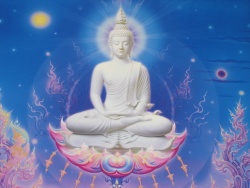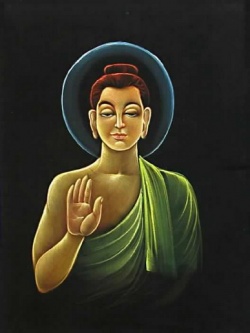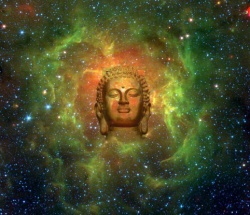Citta(Names)
1. Citta (called Cittagahapati).-A householder of Macchikāsanda, where he was Treasurer.
He was later declared by the Buddha to be pre-eminent among laymen who preached the Doctrine (A.i.26).
On the day of his birth the whole city was covered knee-deep with flowers of various hues, hence his name.
When Mahānāma visited Macchikāsanda, Citta, pleased with his demeanour, invited him to his park, the Ambātakārāma, and built for him a monastery there.
And there the Elder preached to Citta the Salā-yatana-vibhatti and Citta became an Anāgāmī.
Thereafter many monks visited the Ambātakārāma and accepted Citta's hospitality.
Among them was Isidatta, a former acquaintance of Citta, but Isidatta left when he found that his identity had been discovered.
Mahānāma and Mahaka did likewise, after having performed miracles at the request of Citta.
The Citta Samyutta (S.iv.282ff) contains a record of conversations between Citta and members of the Order, among whom, besides those already mentioned, were Kāmabhū and Godatta Thera.
Citta is also said to have had discussions with Nigantha Nātaputta and Acela Kassapa and to have refuted their views.
A Thera named Sudhamma was a permanent resident in the Ambātakārāma and was looked after by Citta.
Once, when the two Chief Disciples and several other eminent Elders came to the Ambātakārāma,
Citta invited first these and then Sudhamma;
the latter, feeling slighted, blamed Citta beyond measure, but the Buddha, hearing of this, sent Sudhamma to ask for Citta's pardon (Vin.ii.15ff; DhA.ii.74f; for details see Sudhamma).
Some time later, Citta visited the Buddha.
He was accompanied by two thousand others and took with him five hundred cartloads of offerings to the Buddha and the Order.
As he fell at the feet of the Buddha, flowers of five hues showered from the sky and the Buddha preached to him the Salāyatana-vibhatti.
For a fortnight he continued distributing his gifts to the Order and the devas filled his carts with all kinds of valuables (AA.i.210).
When Citta lay ill just before his death, devas visited him and advised him to wish for kingship among them, but he refused to aspire to anything so impermanent,
and instructed the devas and his kinsfolk gathered round him, telling them of the Buddha and his teachings (S.iv.302f).
He is regarded as the ideal layman (E.g., at A.i.88; ii.164; iii.451).
He owned a tributary village called Migapattaka (SA.iii.93).
In the time of Padumuttara Buddha, Citta conceived his desire to be placed first among laymen in the teaching of the Dhamma.
In the time of Kassapa Buddha he was a huntsman. One day, seeing a monk in a glen, and being pleased thereat,
he hurried home, prepared a meal and brought it to the monk, together with flowers he had gathered on the way.
After the offering,
he made a wish that he should never lack for tribute and that showers of flowers should fall on him. In the deva-world he surpassed all others in his great beauty (AA.i.209). In the Bhisa Jātaka (J.iii.314), he is identified with the slave.
Though Citta was not an arahant, he possessed the patisambhidā of a probationer (sekha). Vsm.442.
2. Citta.-The Bodhisatta born as a Candāla. For details see the Citta-Sambhuta Jātaka.
3. Citta, Cittaka.-A deer, brother of Rohanta, the Bodhisatta. He is identified with Ananda. For details see the Rohantamiga Jātaka.
4. Citta called Hatthirohaputta (Hatthisāriputta).-A thera, son of an elephant trainer, who, having entered the Order, studied under the Buddha and gained special proficiency in distinguishing subtle differences in the meanings of words.
Six times he left the Order and six times returned.
His last quarrel was with Mahā Kotthita, who objected to his constant interruptions of the Elder's discussions regarding the Abhidhamma.
(This incident is recorded at A.iii.392ff).
It is said (DA.ii.378f.; AA.ii.688) that in the time of Kassapa Buddha, Citta and a friend entered the Order.
When the friend expressed a desire to return to household life, Citta encouraged him to do so, coveting his belongings.
This was the reason for Citta's inability to remain in the Order.
He was a friend of Potthapāda, and when he had returned for the sixth time to a householder's life, Potthapāda brought him to the Buddha.
Citta listened to their conversation and asked questions regarding personality.
At the end of the discourse (recounted in the Potthapāda Sutta) Citta once more joined the Order, never again to leave it, for he soon after became an arahant (D.i.199ff).
The Kuddāla Jātaka (J.i.311f) gives the circumstances in which he first joined the Order.
He was a youth of good family at Sāvatthi. One day, while on his way home from ploughing, he received from the bowl of a certain Elder some rich and dainty food.
In order to gain similar food for himself, he became a monk, but soon after, lust overcame him and he left the homeless life.
Even after he became an arahant his colleagues are said to have taunted him, asking when he would be leaving them, and it was only when the Buddha told them that such a time would never be were they satisfied.
The same story, except for certain details, is also found in the Dhammapada Commentary (DhA.i.305ff), but there Citta is called Cittahattha, and a different explanation is given of his name: esa cittavasiko hutvā vicarati ti Cittahatthan ti nāmam karimsu.
It is further stated that on the last occasion of his leaving home he saw his pregnant wife lying asleep and was so filled with revolt that he returned to the Order.
He started forth at once, a yellow robe tied round his waist, and as he walked to the vihāra, he became a sotāpanna.
The monks were at first reluctant to re-ordain him, but his importunity was so great that they relented, and in a few days he became an arahant.
5. Citta.-One of the chief lay supporters of Sujāta Buddha. Bu.xiii.30.
6. Citta.-A Thera of Ceylon. King Mahādāthika Mahā-nāga had a young and beautiful queen, named Damiladevī. One day, when she was worshipping at the Ambatthala at Cetiyagiri, Citta, who had joined the Order in his old age,
fell in love with her and behaved as one mad, constantly repeating to himself "beautiful as Damiladevī."
Even when told of her death, which took place soon after, he refused to believe the news and continued as before; he became, therefore, known as Ummattaka Citta. AA.i.13.
7. Citta.-A herdsman, servant of Dīghagāmani.
He was put to death by the brothers of Ummāda-Cittā, because he refused to promise to kill Ummāda-Cittā's child should it be a boy. He was reborn as a Yakkha. See Cittarāja. Mhv.ix.22f.; MT.278.
8. Citta.-A minister, spoken of as Cittamahāmatta.
He was very generous and kept in his house a gong, by sounding which monks could obtain the requisites at any time.
Each day he spent sixty kahāpanas for the supply of medicines alone. VibhA.341.
9. Citta.-A city where Mangala Buddha performed his Twin Miracle. BuA.119.



